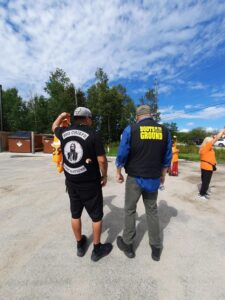Letter to the Editor: The need for more Boots on the Ground

By Steven Rickard
I know that there are a lot of people who are bothered by the fact that homelessness has become another big issue in North Bay. After seeing it first-hand and assisting those who are experiencing homelessness including mental health and/or addictions, the homeless population has certainly increased. The landscape was different when I first started volunteering and providing community outreach with Boots on the Ground in 2019.
The Boots on the Ground team, comprised of civil citizens linked by common interests and collective activity, provides outreach such as peer-to-peer support, clothing/food assistance, and advocacy on behalf of those who don’t have a voice. We serve as the bridge-in-the-gap between our homeless and any available programs/services in the city of North Bay – especially for individuals who are experiencing mental health/addictions. All of us members are volunteers and from different walks of life. We came together as concerned members of the community to help spread awareness and work on improving the ongoing homelessness situation. Before we started calling ourselves Boots on the Ground, we were acting as North Bay Neighbourhood Watch because we were fed up with the increase in various crimes (vehicle/property break-ins, thefts, etc.). Following the first month as a group, we decided to shift our focus towards providing community outreach rather than just crime deterrence.
Throughout my journey in community outreach in the last few years, we’ve seen a definite increase in homeless people and met countless individuals not originally from this area that were put on buses from across southern Ontario told that there were “more accessible services” in North Bay. In my opinion, that is not the case because the service providers in North Bay are faced with client/case overloads and a low number of case/social workers, among other challenges. We’re seeing these services perform at a limited capacity. For example, the North Bay Crisis Centre/Low Barrier Shelter has extended its services for overload clients by providing hotel rooms, especially during the recent extreme cold weather. The Warming Centre has been both beneficial and well-needed resource to our community helping those in need, often out in the frigid elements.
Another big issue that we’re facing as a community is addiction and the overdoses that come with it. There have been times where we’ve had to put our Naloxone or first aid/CPR training into actual use. We’ve lost a lot of good people that we’ve helped on the streets, including people that I knew and grew up with. One of the unfortunate losses was a close friend and former Boots member. She was there when Boots on the Ground was created and did a lot of good work. She was a former user herself and knew a lot of the folks on the streets so people knew who to turn to for assistance or someone to talk to.
There’s a stigma towards homelessness and people with mental health and addictions. We need to address that because it affects us as a community. We see the struggles some have with substance use, mental health issues, and other health concerns, but what we don’t understand is why they’re stuck in that cycle. We tend to look down on the problems and the individual who uses rather than looking at the root causes and the numerous mitigating factors that contribute to homelessness, such as no affordable housing, increase in rent, past traumas, unemployment, mental health, addictions, or new challenges like the COVID-19 pandemic.
We don’t want a community that continuously produces both homelessness and housing instability. We’ve not only heard from our homeless but also those who work within the services that something needs to change. If we want to see changes happen in our community, then we need to start by changing the way we perceive and think about homelessness, addiction, and mental health. We need changes that are a more permanent solution rather than a quick fix. Understanding the needs of our homeless is not just “here’s some food and shelter”, it’s to help them better themselves to be on a path to recovery — it takes more time to “fix” these issues properly. Some may fail time and time again before there is value and retention in the services provided; it will be an uphill battle all around for some but it can be done.
Our community needs to get together to collectively help change the perceptions towards homelessness, addiction, mental health for the well-being of our fellow community members who want to live a better life for themselves. Mental health and addiction is a serious matter and will only get worse before it gets better. Together, it can get done. Together, it can get better.

